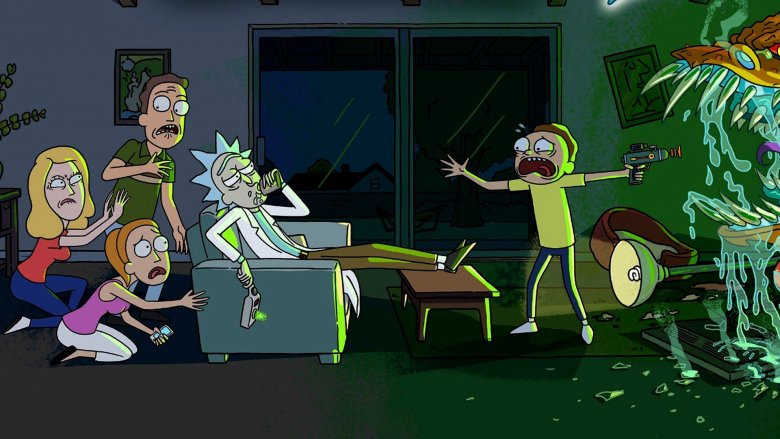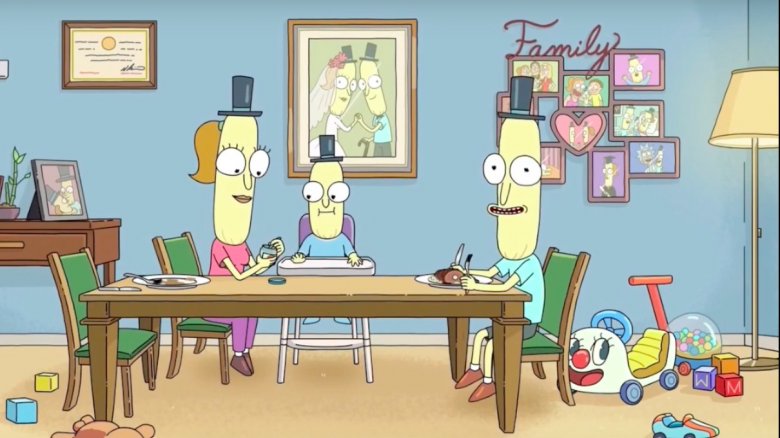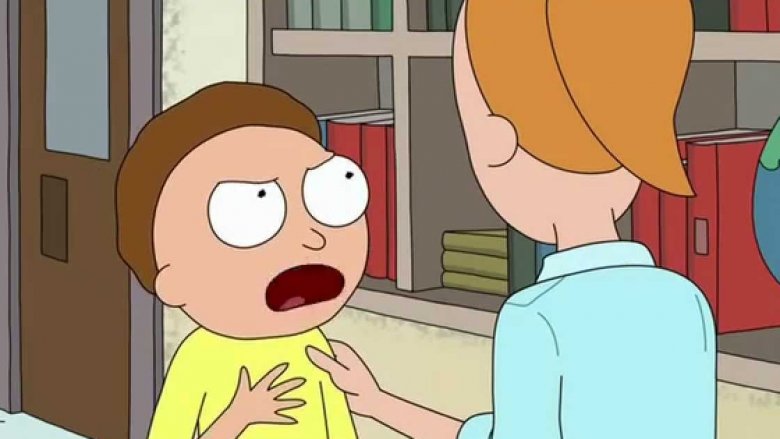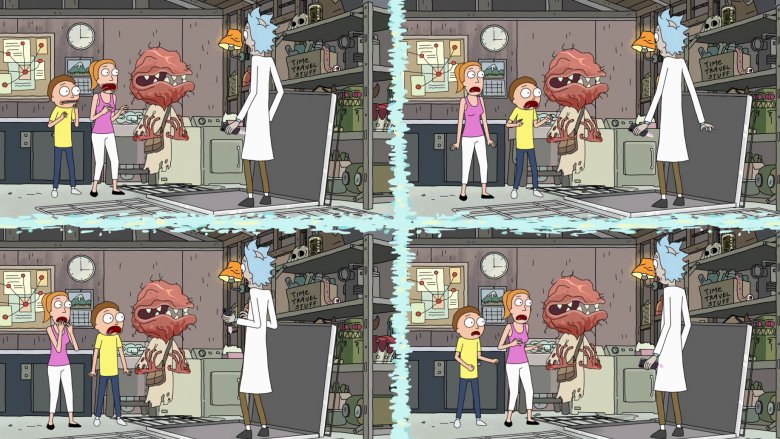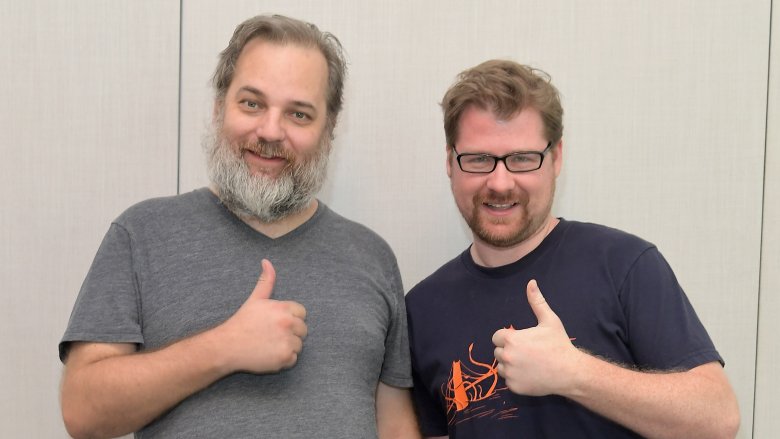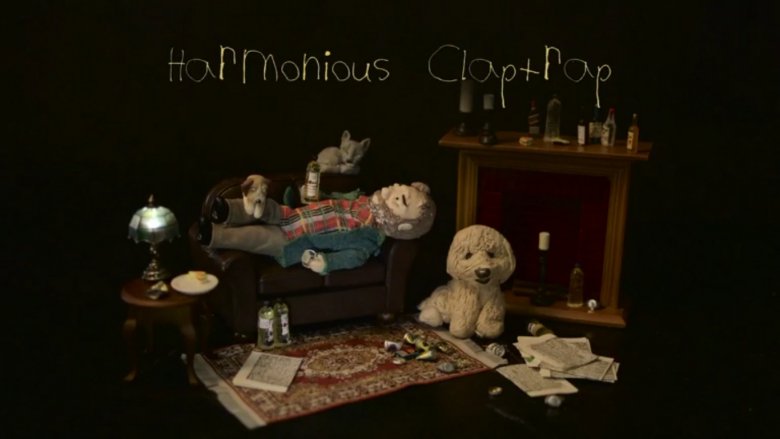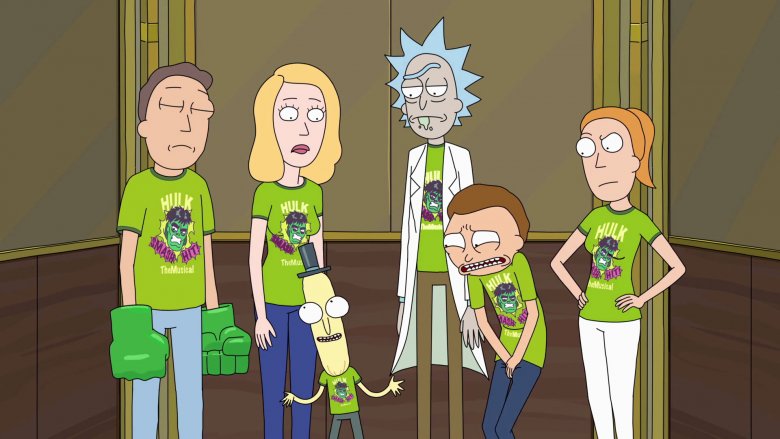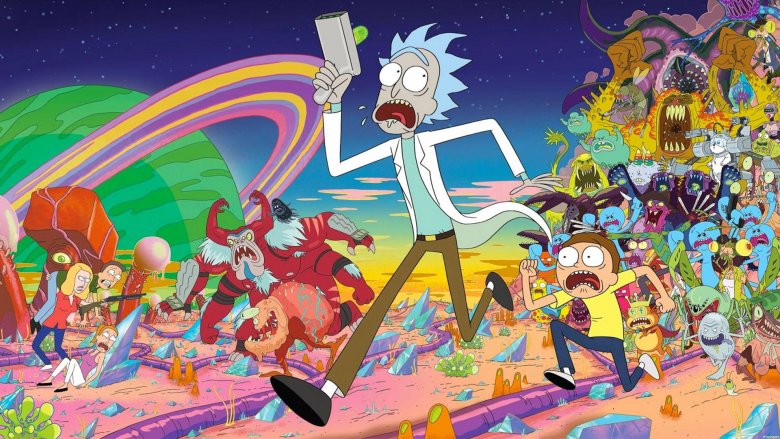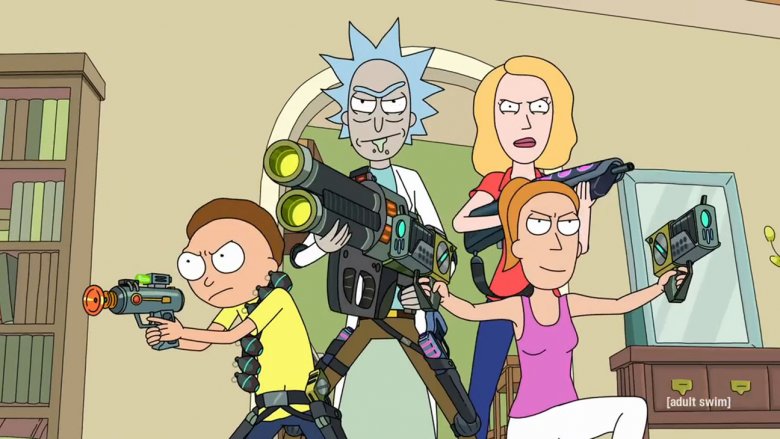Why Rick And Morty Season 4 Is Going To Be A Long Wait
Creating Rick and Morty — a show tackling profound, life-questioning existentialism and simpler matters like sentient pickles and sex robots — is far from an easy task. The road between Season 2 and Season 3 was long, winding, and took 18 months to navigate. The wait for Season 4 looks much the same. Although it'd be nice to have new episodes yesterday, not even the Meeseeks could deliver them quicker.
It's not time to get schwifty, so what is this article's purpose? It's to explain why we have to wait so long for more of Rick, Morty, Jerry, Beth, Summer, and all the quirky characters of Earth C-137 and beyond. Let's grab the portal gun and access the dimension of explanation. From toxic fans to perfectionist (and possibly drunk) creators, here are all the reasons you shouldn't hold your breath for Season 4 any time soon. At least, here in this dimension, anyway.
Mr. Poopybutthole promised a long wait
Rick and Morty's third season was released unexpectedly on April Fool's Day in 2017, almost exactly a year and a half after Season 2's finale, "The Wedding Squanchers," which premiered on October 4, 2015. True to his word, in the post-credits sequence following that episode, Mr. Poopybutthole informed audiences the wait would be "a year and a half, or longer." As a result, it's safe to say the word of the Smith's top-hat-wearing family friend can be trusted.
Mr. Poopybutthole returned for a post-credits scene after Season 3's finale, "The Rickchurian Mortydate." In a typically self-aware nod at how his previous promise fueled online speculation (and frustration), this time Mr. Poopeybutthole didn't specify a timeframe. Instead, he promised Season 4 will arrive in "a really long time," possibly so long he'll have time to grow a beard and become a grandfather.
Perhaps Morty will have time to grow a beard, too; a fourth season hasn't been ordered yet. Yes, there's a chance it may not happen! In January 2018, Adult Swim told Variety there's "no timing to share on premiere or status of production." Surely there's no chance they won't renew the series, though. After all, Season 3 smashed the network's viewing records, was 2017's most popular TV comedy with the millennial generation, and the April Fool's episode alone had 3 million unique visitors on Facebook live.
The script hasn't been written yet
An official confirmation will likely arrive once the visionaries behind the show are back in the confines of the writers' room. Unfortunately, the room is presumably empty, as there's been no pen-to-paper to scribe first drafts or creative brainstorms to think up new ideas. One of the show's key writers, Ryan Ridley, revealed this surprise lack of progress. He's the creative mastermind behind a number of popular episodes, including Season 1's "Close Rick-counters of the Rick Kind," which introduced Evil Morty and the Council of Ricks. Ridley channeled Morty's profanity-rich motivational speech with a blunt expression of his disappointment, telling those involved to "get your s*** together," in an interview with Detroit Cast.
The Community writer confirmed in the interview he's yet to hear any update on the show's production. Ridley's involvement is pretty much certain, so if he hasn't begun writing, it must mean no one else has, either.
Here's where "a really long time" starts to feel like a really long time: Ridley highlighted that, if the timeline between the script's completion and the airing of the show reflects the previous production schedule — eight months from November 2016 to July 2017 — new Rick and Morty episodes won't air until 2019. Late 2019. Where's the backpack?
The show's complexity makes the creative process difficult
To say Rick and Morty's (multiple) universe(s) are rich in detail and complexity would be an gargantuan understatement. The show isn't linked to the online meme "to be fair, you have to have a very high IQ to understand Rick and Morty," for no reason. It's not hard to see why the dimension-hopping animation is readily linked to intellect: on top of meticulous world-building, it's brimming with scientific theory, sci-fi tropes, references to popular culture, philosophy, and psychological theory.
When Rick dabbles with science, a surprising amount based on legitimate theory, particularly quantum physics and string theory. The exploration of the Many-Worlds Interpretation of Quantum Mechanics means audiences can't be 100 percent certain which dimension each episode is based, leading to some wild fan theories. In a particularly somber storyline, "Rick Potion No.9," depicts the "original" Rick and Morty entering a universe where their parallel selves die. They bury their own bodies and resume life in the alternate reality.
"A Rickle in Time" depicts Rick causing a split in space-time, a storyline inspired by Heisenberg's Uncertainty Principle. There's the simulated universe, Roy, illustrated in "Mortynight Run." In a panel at San Diego Comic Con, Justin Roiland explained how he was inspired by other scientific theories including the Fermi Paradox. There's also an abundance of philosophical undertones, most notably nihilism and absurdism.
It's rare to get an episode that doesn't raise a multitude of profound questions about the nature of life, the universe, and everything in it. Crafting that kind of density and complexity doesn't happen on a short schedule.
Dan Harmon and Justin Roiland are perfectionists ...
Rick and Morty has avoided a Sophomore Slump. But ever-growing popularity and critical acclaim has increased the pressure on co-creators Dan Harmon and Justin Roiland. This was evident in the build-up to Season 3. As the pair faced constant queries on the status of the upcoming season, they spoke openly about the weight of expectation they were both feeling.
"We're afraid of letting you down," Harmon told the crowd at last year's San Diego Comic Con. "There's a lot of you — you're kind of scary," he added, illustrating the value the pair place on fans of the show. Roiland referred to this process as the "Vortex of Not-Good-Enough."
The fear of letting people down is aggravated by the pair's extremely high standards. Harmon used Twitter to give an impassioned and earnest explanation on the waiting time between the second and third season. He explained that "the reason S3 took long is because it took long to write, because it was S3 of a show that we were scared to make worse than S2 or S1." He also said the creative process was filled with "tail-chasing," "perfectionism," and "overthinking."
... but they aren't falling out
Dan Harmon created NBC's Community in 2009, long before Rick and Morty was a twinkle in his creative vision. The show earned a cult following, thanks to Harmon's writing ability — using his own methodology, the "story circle" — and razor-sharp wit. However, his time on the show was far from straightforward. In 2013 he was fired as showrunner after three seasons. The reason is a familiar one: Sony Television were putting pressure on for new episodes, but Harmon was determined not to rush the production, and instead focus on quality. After a disappointing fourth season, Harmon returned for Seasons 5 and 6, though that didn't stop him earning a reputation as "difficult" to work with.
His reputation, plus personal difficulties between Seasons 2 and 3, ignited rumors he was falling out with co-creator Roiland. Eagle-eyed viewers will have noticed the logo for Harmon's production company Harmonious Claptrap, switching from a happy family to Harmon, alone. Autobiographical elements from Harmon's life seep into the show, too. Some are overt, like Beth and Jerry going through divorce. Others are more subtle. Harmon often discusses his use of therapy on his podcast, Harmontown. In "Pickle Rick," it's Rick's turn to sit on the couch for therapy with Dr Wong (Susan Sarandon).
Despite personal challenges, Harmon addressed talk of he and Roiland fighting as "hilariously not true even in the slightest." During a hungover Twitter rant, he assured fans that if the duo had fallen out, the world would know about it. If that's still the case, it's safe to say Season 4 isn't delayed due to a rift between the two creators.
Toxic fandom targeted female writers ...
It's unfair to lump all Rick and Morty fans together. Clearly, Adult Swim's animation has a wide appeal. But that didn't stop the show making the headlines a number of times in 2017 for the wrong reasons. As the show has risen in popularity, some fan's dedication has reached intense levels. This "toxic fandom" has resulted in a palpable pressure on Harmon, Roiland, and the creative team. Particularly female writers, Jane Becker, Sarah Carbiener, Jessica Gao and Erica Rosbe.
Some users of Reddit — home to an obsessive online community of fans — singled out the addition of female writers to the show in Season 3, linking them with a perceived dip in quality. Unsavory comments claimed Adult Swim was "forced" to hire female "SJW" writers, an abbreviation for social justice warrior. This term is synonymous with alt-right groups such as #Gamergate, a controversial online trolling group who perpetuate sexism in the gaming industry.
Worse still, female writers Becker and Gao were harassed and had their personal details shared online. This behavior led to Harmon rightly decrying this segment of fans. "These knobs want to protect the content they think they own," he told Entertainment Weekly, "and somehow combine that with their need to be proud of something they have, which is often only their race or gender."
There's no news on who will make up the writing team for Season 4 as of yet, but it'd be disappointing (albeit understandable) if Becker and Gao had second thoughts on returning due to this foolish minority of so-called fans, which could in turn delay production.
... and faced meltdown over Szechuan sauce
In Season 3's premiere, "The Rickshank Rickdemption," Rick drives to McDonald's in search of Szechuan sauce, a limited-release dipping sauce. This seemingly innocuous sequence spawned a popular culture phenomenon in rapid time. The following day an online petition was launched to bring the flavor back. Momentum grew; in July, Roiland shared an image of a two-liter bottle of the sauce on Twitter, and jars of the sauce saved from 1998 were selling for thousands of dollars on eBay.
Things got out of hand in October last year, after McDonald's agreed to release limited supplies for one day only. Fans waited in line for hours, but unsurprisingly, supplies quickly ran out. What ensued can only be described as a meltdown. As well as laughable videos surfacing on social media, such as the above, events took an uglier turn, with a number of reports of staff harassment. It was like Black Friday on interdimensional cable.
From small plot point to full-on pop-culture meltdown, Roiland and Harmon are both hyper-aware of the ripple effect of their work. The magnitude of this ripple effect could increase pressure on the writing duo, and cause more deliberation during the creative process as a result.
It takes a long time to animate the show
As well as complicated storylines, Rick and Morty takes a long time to animate — the ten episodes of Season 3 took eight months. Animators use Toon Boom Storyboard Pro and Harmony software to animate the show, a much longer process than traditional 2D animation. In an interview with Spreaker podcast, Roiland explained the process of creating the show in this format. "It takes a lot of work to finesse something up to the point where it actually looks like a cartoon," he said.
Harmon and Roiland's perfectionism extends beyond the script to the animation, too, often the pair aren't satisfied with the final outcome. Making their task harder is the fact the show is often visually dense, its hallucinogenic frames packed with a kaleidoscope of fantastical species and weird environments. Other animations, such as Family Guy, South Park, or The Simpsons, don't have as much going on frame by frame, making the task presumably easier for animators to bring to two-dimensional life.
There may be more episodes in Season 4
To date, there have been 31 episodes of Rick and Morty — 11 in Season 1, followed by ten episodes each in Seasons 2 and 3. However, during a Magic City Comic Con in December 2016, Harmon promised 14 episodes in Season 3. During a later appearance at the Rick and Morty live stream event, Harmon then backtracked, confirming the third season would only consist of ten episodes. Harmon's attentiveness to quality and high standards appears to be responsible.
"I don't want to poison the well but the finale is a great episode that we finale-ified when we realized we weren't going to be able to make 14," he told Entertainment Weekly. In the same interview, Harmon acknowledged "falling apart" during the third season of Community, before illustrating his determination to prove he has learned from the experience by aiming for 14 episode quality for Season 4.
Season 3's 10 episodes took eight months to animate. It doesn't take Rick Sanchez to calculate four more would increase production time by at least three months, in addition to the extra time needed to write the scripts.
Could there be another surprise?
No script. No confirmation. No Szechuan sauce. More episodes. It feels like the wait will be forever and forever, 100 years or more, doesn't it? But let's not despair too soon. Although it's reasonable to prepare for a long wait, there could be more from Rick and Morty before Ridley's estimated late-2019 release date. Those behind the show love to keep fans guessing. Case in point was last season's premiere, which made a surprise, unannounced launch on April Fool's day.
Typical of the show's jovial and meta-teasing tone, many fans were unsure if this was a joke. But there it was, streamed on Facebook live without so much as a Tweet to prepare people. So could the same thing happen again? There could be a surprise announcement or other cool clips — such as Rick and Morty's recent appearance in Run the Jewels' new music video, "Oh Mama."
Without wanting to increase expectations or a closer release, the conspiratorial amongst us might be thinking the absence of information is a clever marketing tool to ease the pressure on Harmon and Roiland. Think about it; knowing how frenzied speculation became last year, what better way to avoid it than by making everyone think production hadn't even started? Wishful thinking, maybe.
